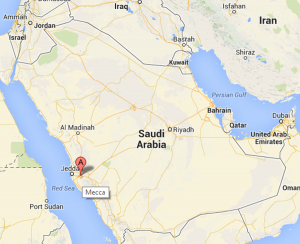Mecca, Saudi Arabia, January 31 – The joke remains relevant, but poignantly less so now: you might find Coca-Cola in the holy city of Mecca, but you will no longer find a Chabad shaliach.
After three years of keeping the local Chabad house operational, Mordechai and Esther Saperstein are closing up. Despite tireless efforts to make the place a welcoming second home for Jews spending time in Islam’s holiest city, they have found themselves unable to attract even a single Jewish visitor – let alone someone to participate in Sabbath services or a Passover Seder.
The shaliach, or emissary, is tasked with providing for the basic spiritual needs of any Jew who comes along: kosher food, a sympathetic ear, Torah classes, ritual circumcision, and more. Chabad emissaries are trained in matters of Jewish law as well as more esoteric lore, and are charged with conducting their own fundraising to maintain operations. The Sapersteins came to Mecca finding the modest dress of women and the bearded faces of men a familiar backdrop, though they were raised in faraway Crown Heights, Brooklyn.
As soon as they arrived, the couple set about establishing a domestic space that could double as a community center: they rented a small building with a room that could function as a small synagogue, and procured an industrial-sized refrigerator and freezer to store the large quantities of kosher food they would need to have on hand.
In addition to his Rabbinic ordination, Mordechai also learned how to be a shochet, an expert in the ritual slaughter of animals according to Jewish law. So the Sapersteins were well supplied with beef, lamb, and chicken, as the animals were freely available on the market, though few of their neighbors understood why they bought coarse salt in such large quantities; they needed it to help remove the blood from the meat to render it kosher for cooking.
But no one else ever showed up to ask where they could get kosher food, or to find a place to pray on the Sabbath. Mordechai had several spare sets of Tefillin available in case anyone was interested in putting them on, but they lay unused for three years. After slaughtering a lamb and a cow, the two found themselves eating it little by little, all by themselves. Needless to say, no one ever inquired about Mordechai’s services as a mohel, or where to get matzo for Passover.
Last month, after several weeks of negotiations, the Sapersteins finally received approval from Chabad headquarters in Crown Heights to close their operation. “We’re going to reopen in Tel Aviv,” said Mordechai, ”but I’m not sure there are any Jews there.”


